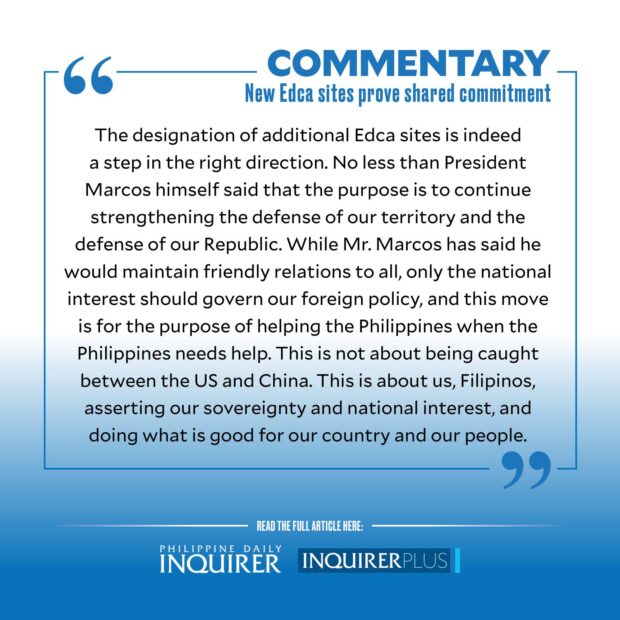New Edca sites prove shared commitment

On April 3, Malacañang announced that there would be four new locations for the Philippines’ Enhanced Defense Cooperation Agreement (Edca) with the United States. These new locations—the Camilo Osias Naval Base in Sta. Ana, Cagayan; Lal-lo Airport in Lal-lo, Cagayan; Camp Melchor dela Cruz in Gamu, Isabela and Balabac Island in Palawan—will be in addition to the existing sites in Cesar Basa Air Base in Pampanga, Fort Magsaysay Military Reservation in Nueva Ecija, Lumbia Air Base in Cagayan de Oro, Antonio Bautista Air Base in Palawan, and Mactan-Benito Ebuen Air Base in Cebu.
The Edca, which was signed in 2014, allows US military personnel to train with local troops as well as build and operate facilities inside military bases. A complement to the 1951 Mutual Defense Treaty between the two countries, Edca also allows US supplies and equipment to be prepositioned in the Philippines.
The designation of additional Edca sites is a welcome strategic development—and for many reasons.
First, we can consider this in light of China’s recent acts of aggression in the West Philippine Sea (WPS). The Edca enhances our military’s capability to protect our country by reaffirming our national sovereignty and territorial integrity in the WPS. In the words of our envoy to the US, Ambassador Jose Manuel “Babe” Romualdez, and Defense Secretary Carlito Galvez Jr., this is a major boost to the country’s push for strategic defense capabilities. We will be able to respond more quickly and efficiently to distress calls. Second, it enables us to protect not just the area covering the WPS but also the eastern seaboard, specifically Benham Rise. In fact, some local government units that initially objected to the Edca sites are now in full support of the development.
Third, Edca fortifies the partnership and strengthens the interoperability of the US and the Philippines. It would allow both countries to respond together more seamlessly to address a wide range of shared challenges in the Indo-Pacific region. This will allow us to participate more fully and meaningfully in maintaining collective defense in the region. Efforts with the US and other like-minded nations will be to maintain peace, freedom of movement, and foster prosperity.
Fourth, humanitarian assistance and disaster relief operations would also be facilitated in the event of natural or man-made emergencies.
The fifth pertains to economic upsides: The construction of facilities and the upgrading of infrastructure will ensure the welfare of communities and of Filipinos in general.
Indeed, the additional Edca sites demonstrate the longstanding and deeply-rooted alliance between the US and the Philippines, and their shared commitment to peace, security, and a rules-based international order. Earlier this month, United States Secretary of Defense Lloyd J. Austin III said the new sites “will help us work together even more closely to meet the challenges we share.”
No less than the Filipinos themselves have given the imprimatur to this administration to engage in and fortify existing partnerships to uphold the rules-based order. A Pulse Asia survey commissioned by the Stratbase ADR Institute found that 80 percent of Filipinos believe that the Marcos administration must strengthen our military capability to effectively address the issues in the WPS, conduct joint maritime patrols and military exercises with allied countries, and fully implement the Visiting Forces Agreement and the Edca.
This same survey showed that it is still the US that enjoys the trust of most Filipinos—84 percent—as we defend our sovereignty.
The designation of additional Edca sites is indeed a step in the right direction. No less than President Marcos himself said that the purpose is to continue strengthening the defense of our territory and the defense of our Republic. While Mr. Marcos has said he would maintain friendly relations to all, only the national interest should govern our foreign policy, and this move is for the purpose of helping the Philippines when the Philippines needs help. This is not about being caught between the US and China. This is about us, Filipinos, asserting our sovereignty and national interest, and doing what is good for our country and our people.
The new Edca sites are a laudable strategic move that sends a strong message that the Philippines stands firm with its allies in upholding the rules-based international order that has nurtured decades of economic prosperity in the region.
—————–
Dindo Manhit is founder and CEO of the Stratbase Group.




















